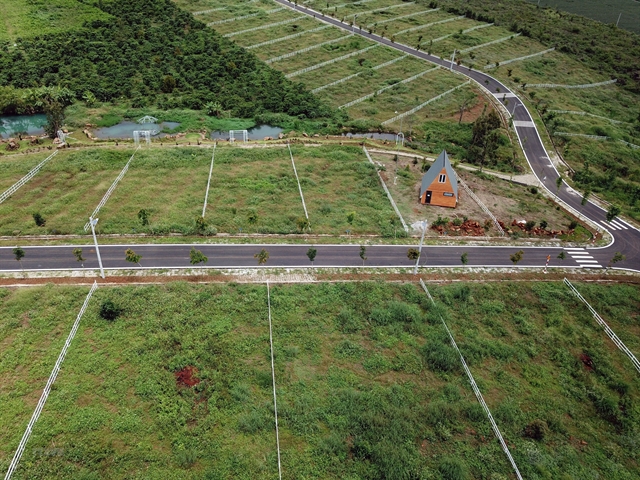 Economy
Economy


|
| Land split into lots for sale. The real estate market was slowing down on the tightening of credit flow into certain segments. — VNA/VNS Photo |
HÀ NỘI — As moves are taken to control the credit flow into certain segments, while localities seek to tighten the land lot split, the real estate market could slow down, but experts remain divided on the risk of the bubble bursting.
In recent years, land prices increased rapidly despite the impact of the COVID-19 pandemic.
According to a report by the Department of Housing and Real Estate Market Management under the Ministry of Construction, land prices, especially in localities planning or developing infrastructure saw whopping increases.
The moves to control credit flow into the real estate sector and land lot split were cooling the market, with falling liquidity but prices staying at high levels.
A report by real estate portal batdongsan.com.vn showed that searches for property on sale via the portal in the first five months of this year dropped by 11 per cent against the same period last year.
Nguyễn Quốc Anh, deputy director general of batdongsan.com.vn, said the market was slowing down significantly with interest in buying a property decreasing by 9e per cent.
The number of listings for sale increased by 22 per cent, especially land by 38 per cent, reflecting that investors and trading floors were struggling and the easy period was over, he said.
Quốc Anh said that many banks had run out of credit room for real estate loans, together with increases in taxes on real estate transfers, which was making profits less attractive. Therefore, investors were more cautious when putting down their money.
According to Đặng Hoài Nam, director of Tiến Phước Real Estate Joint Stock Company, the market was slowing down but wasn't frozen, providing opportunities for products with real value. “The slowdown is a wake-up call for investors and an opportunity to purify the market,” he said.
Nam pointed out that products which were in strategic locations with synchronous infrastructure and adequate facilities and services would be more attractive to buyers, especially amid a shortage of quality products in rapidly developing urban areas such as HCM City.
Nam said that it was time for developers to review their investment strategy to move toward customers’ demands.
Sử Ngọc Khương, senior director of Savills Việt Nam, said that the market was facing low supply and high prices, resulting in limited liquidity, predicting that the trend would continue till the end of this year.
According to financial and banking expert Lê Xuân Nghĩa, while the market was facing a serious shortage of supply due to legal problems hitting housing development projects, the tightening of capital flow into the real estate market, including credit and corporate bonds, would worsen the situation.
Nghĩa said that he was worried that a market bubble could occur and burst like in the 2011-12 crisis, stressing that careful consideration should be given to the moves of tightening credit and bonds into the real estate market. In addition, measures to stabilise the market must be developed, he said.
The Việt Nam Association of Realtors said that rising house prices but low liquidity was a signal that the market was in a partial bubble. Notably, house prices also increased following land prices and established new levels in many places but the transaction volume remained modest.
Meanwhile, some said that there was no sign of the market bubble bursting.
Citing statistics of batdongsan.com.vn, Quốc Anh said that the real estate prices remained high because there was still huge market demand while the supply was limited. It would be difficult for housing prices to drop in this situation, he said.
In addition, market liquidity falling in recent months was partly due to speculators escaping the market, he pointed out.
He forecast housing prices would continue to increase, however, the pace would not be as strong as in 2021, especially for projects with adequate legal status and good locations. — VNS




